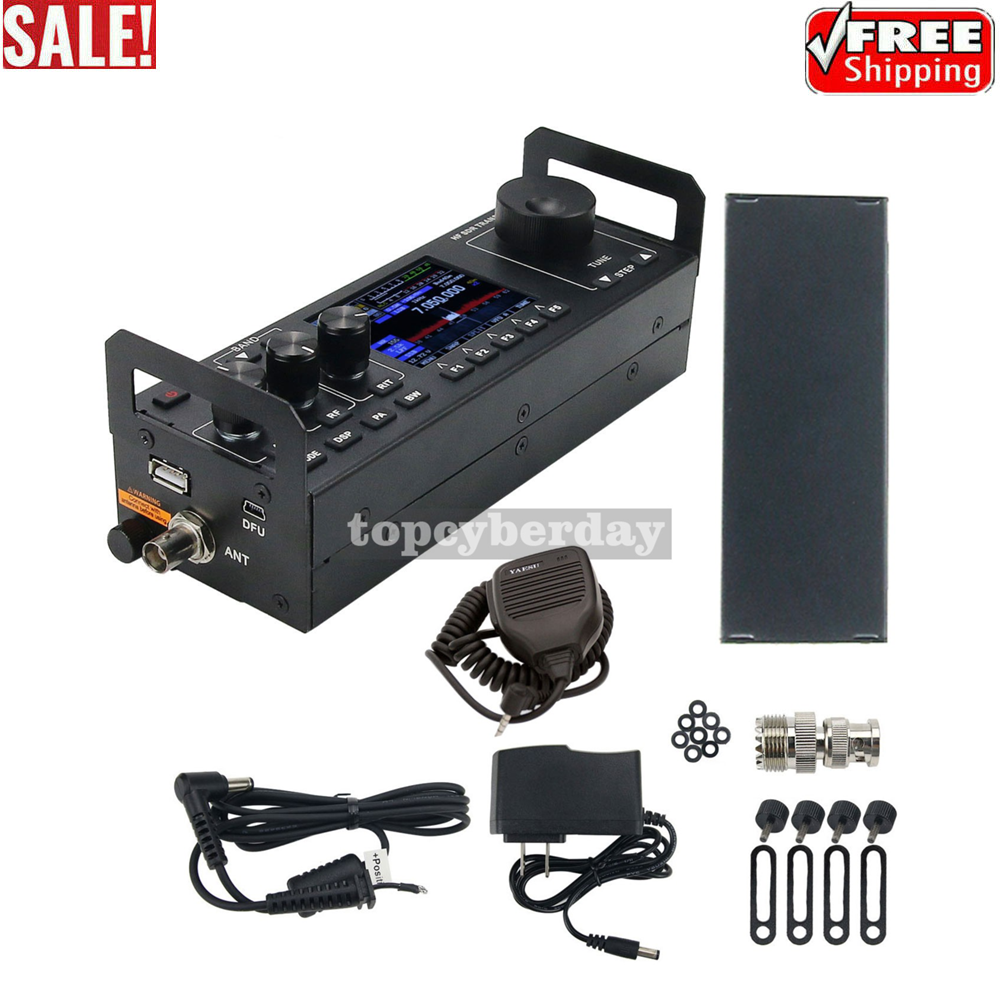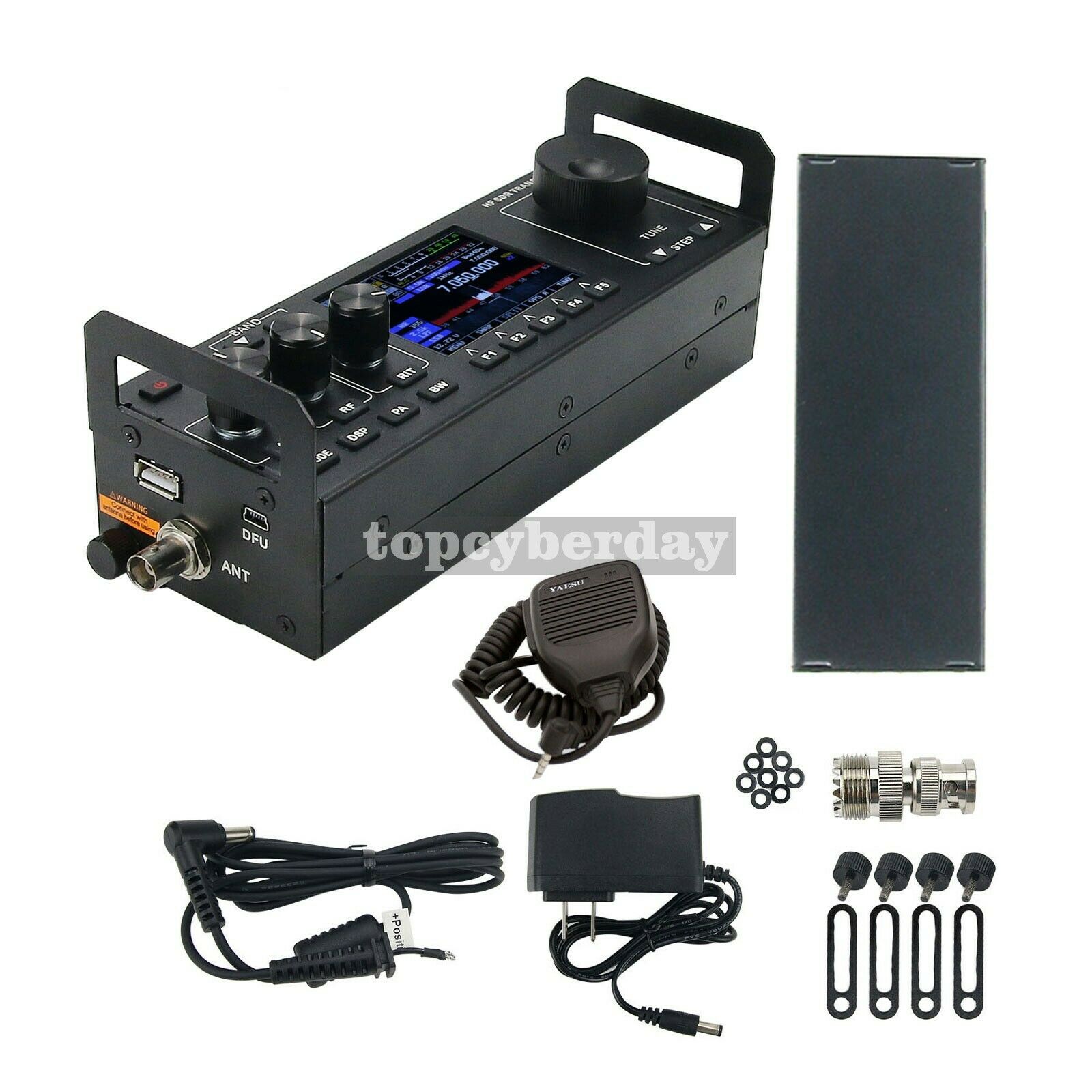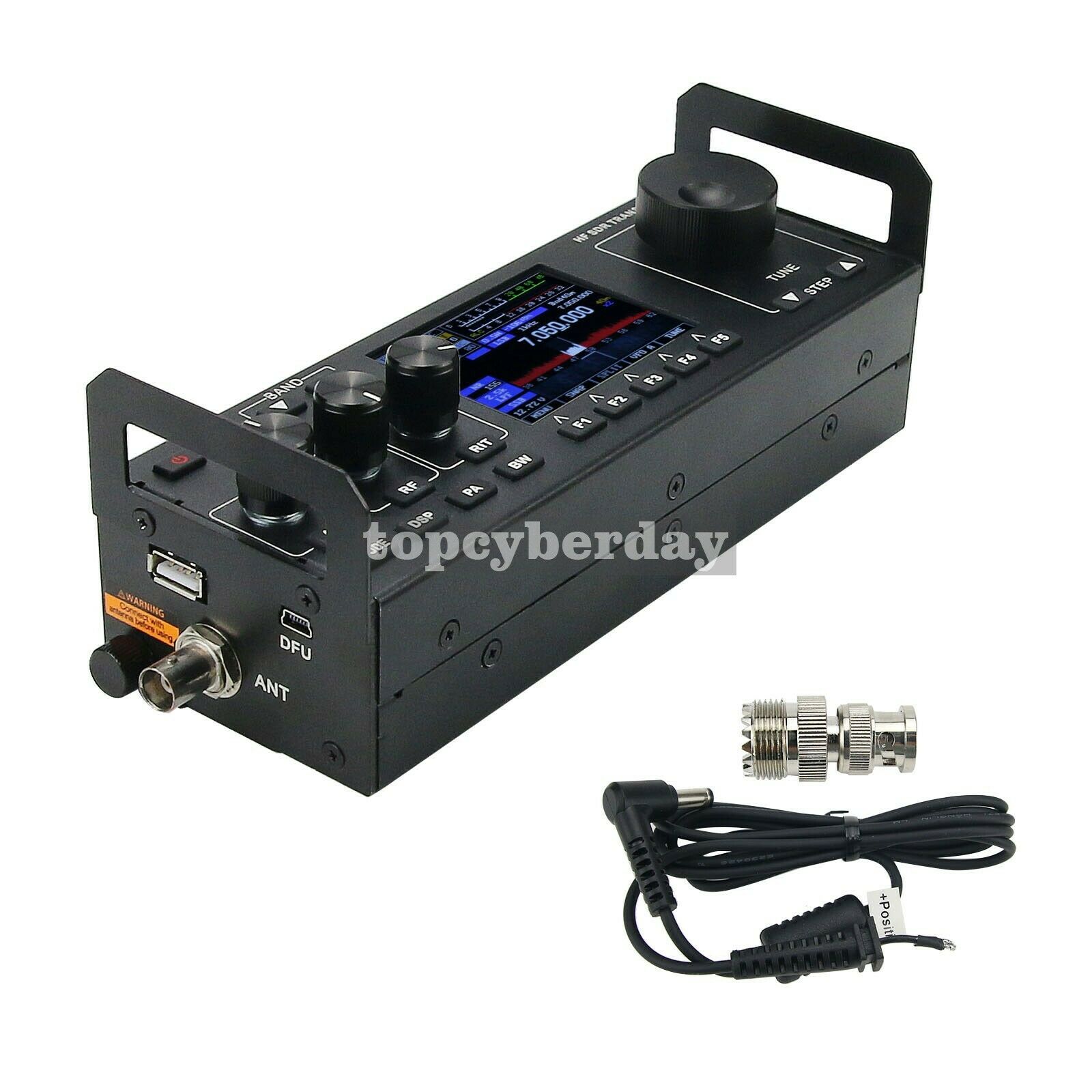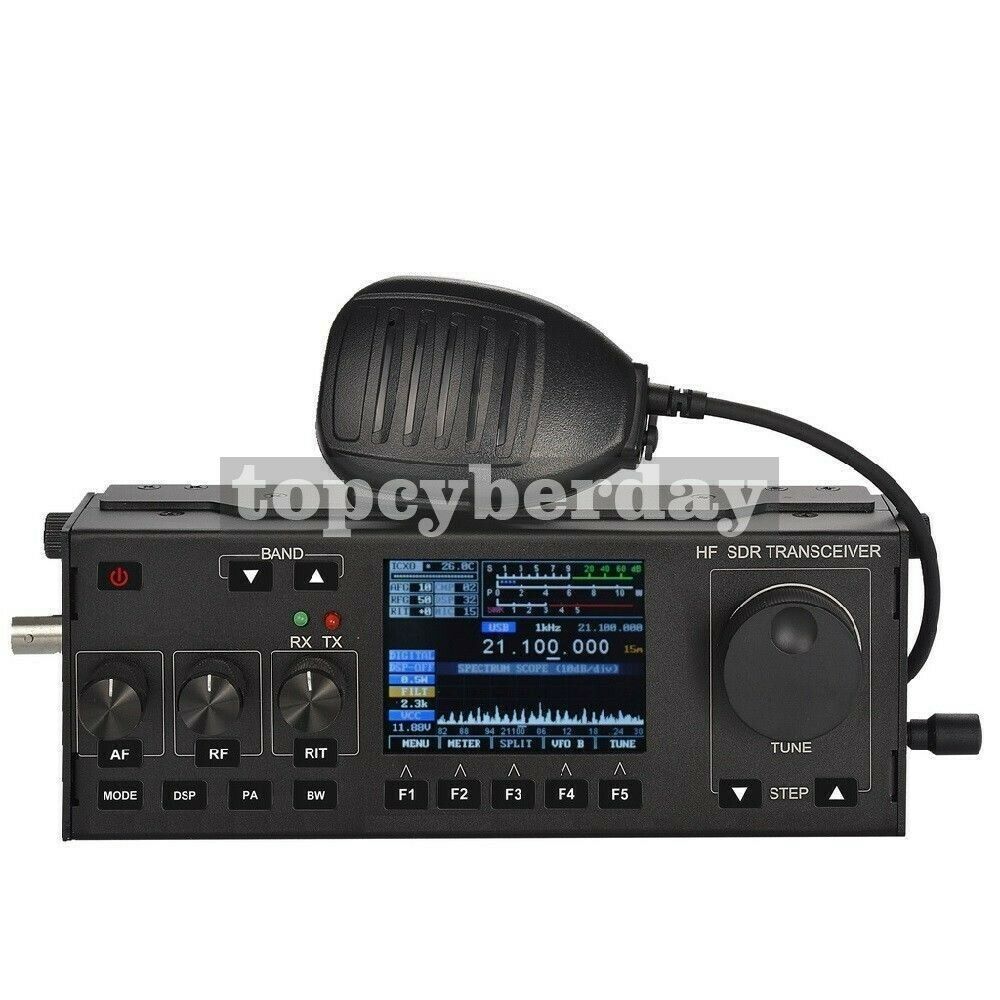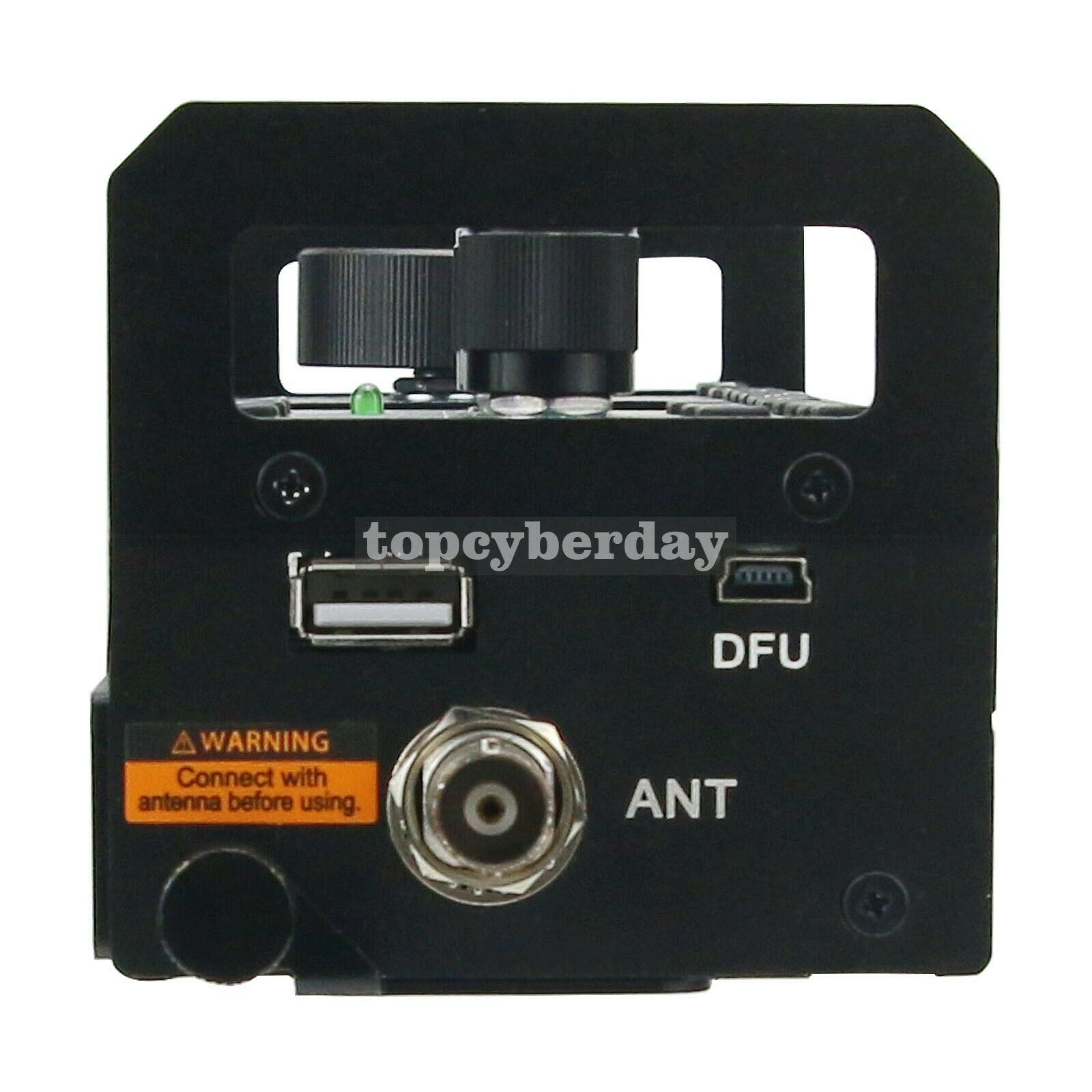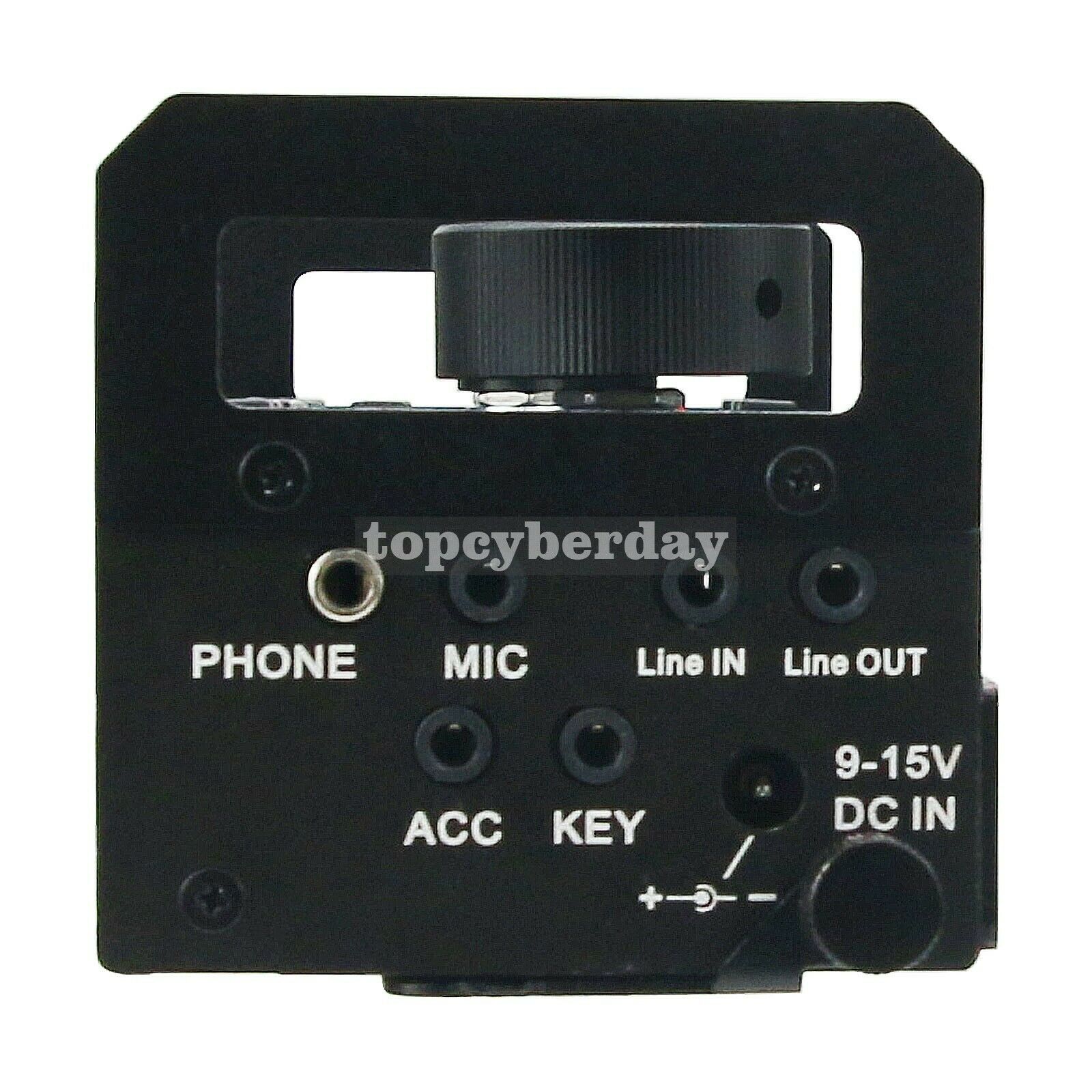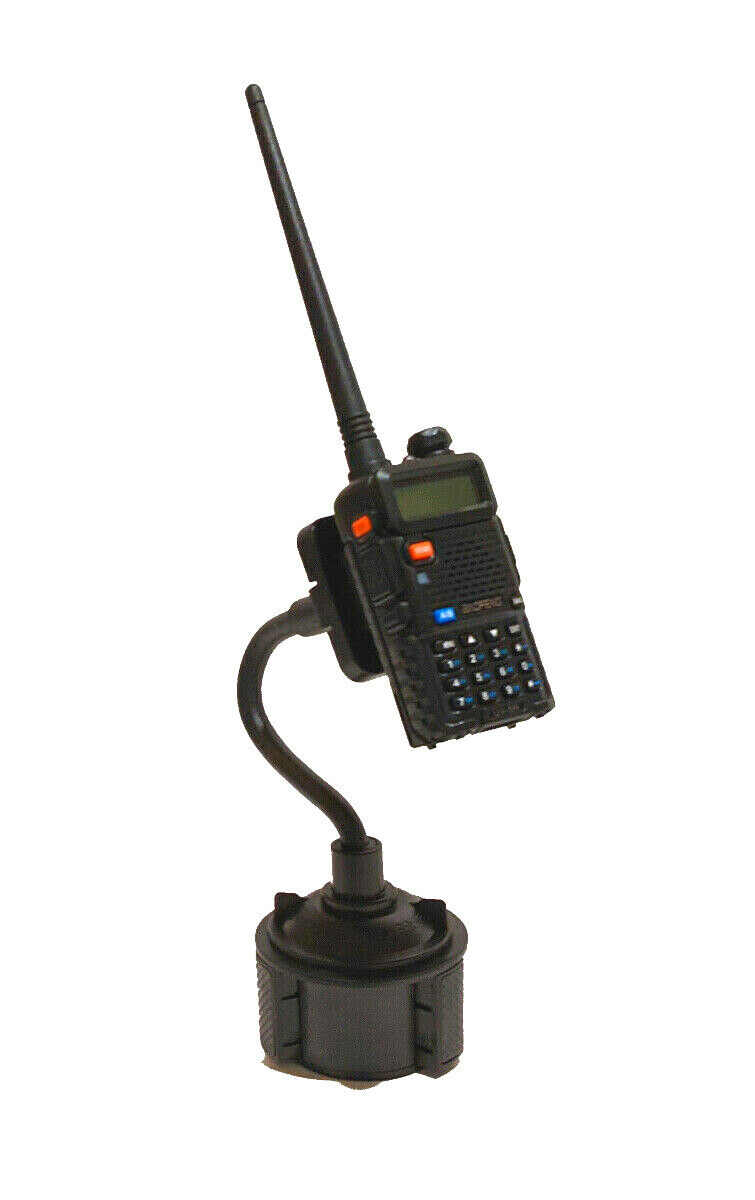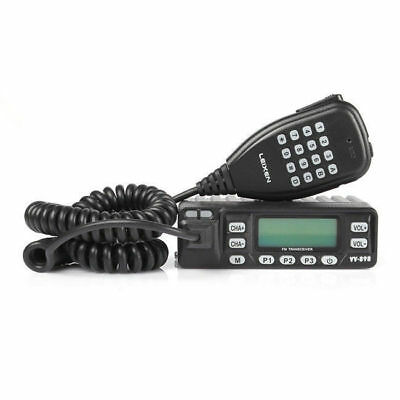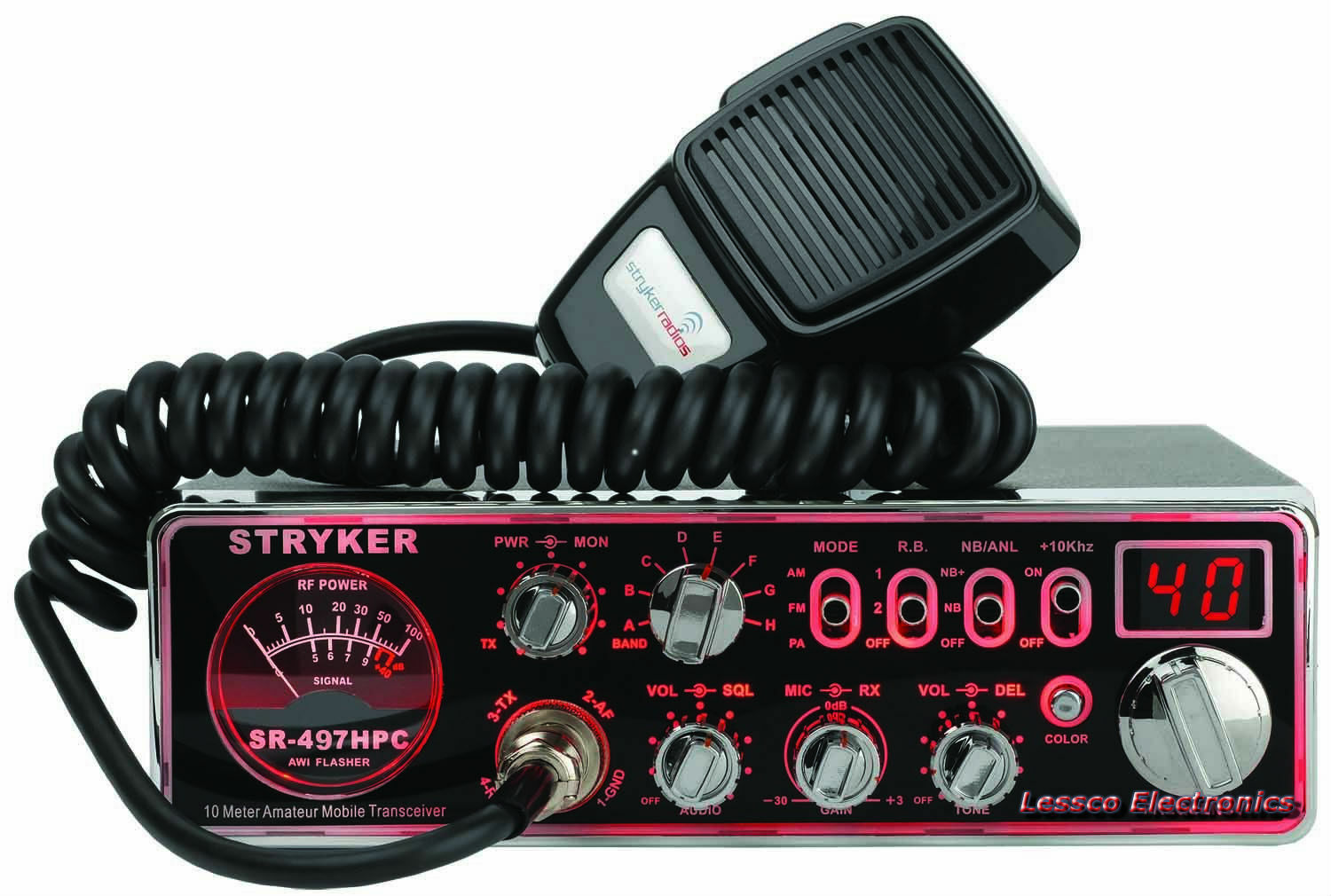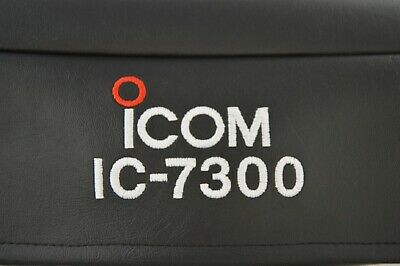-40%
RS-918 15W HF SDR Transceiver MCHF-QRP Transceiver Amateur Shortwave Radio LOT
$ 26.92
- Description
- Size Guide
Description
DescriptionRS-918 15W HF SDR Transceiver MCHF-QRP Transceiver Amateur Shortwave Radio With Charger
Version Introduction:
There is no battery in the package. 11.1V 6800mAh battery is recommended.
Note:
- Its knob is slightly different duet to different production batches. Please make sure that you don't mind before purchasing.
- Touch screen is enabled by default!
- Bootloader: DF8OE's bootloader version 4.0.0. (if there is any request about the original official bootloader, please let us know, you can also easily flash yourself back to the original bootloader without opening the J6 closure).
- Please connect the correct power supply and antenna before power-on. Incorrect connection of the power supply and antenna may damage the transceiver.
Description:
mcHF is a SDR HF QRP transceiver. It features small and portable design, cost-effective, complete functions, and direct software radio line models. For electronics enthusiasts who love DIY and hardware, this is a very good training kit, which can be used to familiarize with the working principle of amateur radio transceivers. For software enthusiasts who write code, programming and code farmers, they can take advantage of its hardware, modify source code, add or reduce some functions, give full play to code farmer's technical talents, and modify and upgrade the software of this machine. For college students studying electronic technology, it can be used to test their learning level. And QRP communication enthusiasts can use the installed kit for various outdoor QRP communication, especially digital communication using PSK31, RTTY and JT65. For emergency communications, mcHF is a compact and portable emergency communications equipment. Shortwave radio stations should try to avoid using switching power supplies, and it is recommended to use batteries or linear power supplies (the power supply with a power frequency power transformer is the best).
Basic Parameters:
- Machine size: 190 x 69 x 45mm/7.5 x 2.7 x 1.8"
- Frequency range: Receiving: 0.8M-32MHz
- Transmission: all HAM HF bands
- Working mode: SSB (J3E), CW(A1A), AM(A3E)
- Minimum frequency step: 1Hz
- Antenna impedance: 50Ω
- Working temperature range: -10℃ to +60℃
- Frequency stability: ±1.5ppm at 5 minutes after booting, -10℃ to +60℃ (standard configuration); ±0.5ppm at 5 minutes after booting, -10℃ to +60℃ (TCXO-M)
- Working voltage: 9~15V DC
- Working current: Receiver 410MA-440MA (maximum display brightness), the minimum LCD brightness can be reduced by 40-60MA, after hardware improvement, it will be reduced by 50%-80%, about 60MA after shutdown, and 3-5MA after power amplifier driver level improvement
- Transmission: 3A (FULL) 1.5A (5W)
- Transmitting frequency band: 80, 60, 40, 30, 20, 17, 15, 12 and 10 meter amateur band
- Transmitting power: nominal 10W, 15W (at 13.8V FULL)
- Modulation method: SSB software balance modulation; AM software low level modulation
- Spurious suppression: ≥40dBc
- Carrier suppression: ≥45dBc
- Selectivity: SSB 2.3KHz (-6db)
- CW 500Hz (-6db)
- Receiving sensitivity: 0.11uV-0.89uV (RFC 50-20)
- Receiving frequency band: 3.5-30 MHz (nominal), the widest continuous coverage 0.8-32 MHz
- Dynamic range: better than 95dB
- RIT frequency fine-tuning range: ±1kHz
- Audio output: 0.5W at 8 ohms
Specifications:
- HF QRP transceiver, can be connected to 12v battery and ANT.
- DC input: 9-13V, maximum: 3A
- Output power: <= 10W
- Transmission: 160, 80, 60, 40, 30, 20, 17, 15, 12 and 10 meter amateur bands
- Reception: 3.5-30 MHz nominal value, including general coverage; 0.888-32 MHz (reduced specifications).
- Mode: CW, LSB, USB, AM, FM (N, W), SAM, FreeDV
- Bandwidth: 300Hz-10Khz Adj
- SWR: display 1-5
- Better than -108 dBm (0.89uV) in 2.3 kHz bandwidth
- Better than -120 dBm (0.22uV) in 300 Hz bandwidth
- Shell design: removable
- STM32f407VGT6 1M RAM
Technical Criteria:
Because this is a software-defined radio and due to ongoing modifications/improvements of the software and hardware, the specifications continue to improve.
- Receiver sensitivity for 10dB S/N, CCITT filtering, taken at 28.3 MHz:
- Frequency Translation enabled:
* Better than -111 dBm (0.6uV) in a 2.3 kHz bandwidth
* Better than -126 dBm (0.11uV) in a 300 Hz bandwidth
- Frequency Translation Disabled:
* Better than -108 dBm (0.89uV) in a 2.3 kHz bandwidth
* Better than -120 dBm (0.22uV) in a 300 Hz bandwidth
- Attention: The above specifications are for a receiver on which the published sensitivity modifications are performed.
Frequency Coverage:
- Transmit: 160, 80, 60, 40, 30, 20, 17, 15, 12 and 10 meter amateur bands.
- Receive: 3.5-30 MHz nominal including general coverage,0.8-32 MHz at reduced specifications.
- Attention: The ability of the Si570 to tune the radio below 2.5 MHz is not guaranteed in its specifications, but most units have enough range to tune just below 1.8 Mhz. Maybe there are some small gaps where LO does not work-if it works, it works fine. Indicator is the color of digits.
Frequency Digits:
- White: fully working
- Yellow: mostly working, maybe there are some small gaps
- Red: not working
Spectral Display Modes:
- Spectrum Scope: This is a spectrum analyzer with the vertical divisions representing user definable amplitude variations of 5,7.5,10, 15,20,1 S-Unit (6dB),2 S-Units (12dB) or 3 S-Units).The baseline ("reference level") of the analyzer is automatically adjusted so that the signals within the displayed passband best fit the dynamic range selected by the user selected dB/division. A graticule along the bottom of the display indicates the approximate frequency of the signal being displayed over a width of +/- 24 kHz. (48 kHz total)
- Waterfall Display: As with the spectrum scope, the frequency is displayed along the "x" axis but the signal strength is implied by the displayed color. The newest signals are displayed along the bottom of the screen, but as new readings arrive, the representations of the older signals are shifted upwards giving an ephemeral time record of recent activity on nearby frequencies. There are several options for color "palettes" that range from simple grayscale to "cold-hot" to "rainbow" to represent weak to strong signals.
There is also a "Magnify" mode for both the Spectrum Scope and Waterfall Display mode that provides 2x magnification, reducing the visible spectral width to just +/- 12 kHz (24 kHz total.) Both the Spectrum Scope and Waterfall Display are very highly configurable. It is possible to disable one or both spectral display modes if desired.
Large-signal handling capability: Continuous "Clip Warning" occurs above approximately -28 dBm and actual A/D clipping and distortion occurs at and above approximately -18 dBm for signals +/- the local oscillator frequency and higher for signals outside this range.
Transmitter power output: <=10 Watts, typical, linear. Modifications may be made to increase this: Follow the discussions in the group for Yahoo.
Frequency stability: +/- 30 Hz at 14 MHz over the range of 10 to 35 C, ambient with the transceiver in the case or better with the TCXO active. (It can be much better than this.
Available TX/RX Modes:
- CW, USB, LSB, AM (full-carrier, double-sideband), SAM (double side band reception) and FM.AM transmit and FM transmit/receive capabilities are available ONLY if the "frequency translate" is activated (highly recommended!)
- FM options: Carrier (ultrasonic) squelch, subaudible tone encoding and decoding, tone burst ("whistle up") generation, "narrow" (+/-2.5 kHz) and "wide" (+/-5 kHz) deviation and the selection of 7.2,10,12 or 15 kHz pre-detection receive bandwidths.
FM Sensitivity For 12 dB SINAD, CCITT Filtering:
7.2 kHz BW filter: -103.7 dBm (1.46uV) with 1 kHz tone at +/-1.5 kHz
10 kHz BW filter: -102.1 dBm (1.75uV) with 1 kHz tone at +/-1.5 kHz
10 kHz BW filter: -104.0 dBm (1.41uV) with 1 kHz tone at +/- 3kHz
12 kHz BW filter: -102.7 dBm (1.63uV) with 1 kHz tone at +/- 3kHz
15 kHz BW filter: -99dBm dBm (2.50uV) with 1 kHz tone at +/- 3 kHz
CW mode receive/transmit and frequency display details: Nine modes of CW display/shifting are available to emulate the various makes of radios and suit the user's taste, ranging from no shifting, display-only shifting, display and LO shifting and manual or automatic LSB/USB shifting.
In CW mode "CW-L" or "CW-U", is displayed depending on whether LSB or USB is being used for reception.
CW Speed range: 5-48 WPM.
Available audio filter bandwidths in this firmware version: 300 Hz, 500 Hz,1.8 kHz,2.3 kHz,3.6 kHz, with a "wide" filter of 5,6,7.5 or 10 kHz being selectable in all modes except FM, where the filtering is done prior to demodulation as noted above. All filters are software defined and additional bandwidths could be made available. Filters can be used as BPF or as LPF selectable in main menu.
DSP Filtering Capability: Noise reduction and Automatic Notch Filter with adjustable parameters. Notch filtering is disabled in CW mode for (obvious reasons) or when using a "wide" receive bandwidth. (devel-branch: Because NR activation leads to instability of mcHF it is disabled by default. If you want to use it (and risk instabilities in various scenarios) you can activate NR in config menu "last item". Setting will NOT BE STORED and must be activated after every powering on. When NR issues are fixed and NR will be improved this function will be obsolete.)
S-Meter calibration: "Industry Standard"(IARU Region 1, Technical recommendation R.1) Smeter calibration where S-9 = -73dBm (50.2uV at 50 ohms) with each "S" unit representing 6dB. Units above S-9 are in dB units, as noted.
External Audio Input/Output Connections:
- "Line In" and "Line Out" audio ports, and a "PTT"(Push-to-Talk) are provided via 3.5mm connectors to allow the connection to an external device. With these connectors it is possible to interface with an external device (a computer or tablet/smart phone) and operate "Sound Card" modes with the mcHF such as SSTV,PSK31,WSPR and other analog/digital modes.
- (devel-branch only): There is CAT function and audio-in and out also as IQ in and out via USB available. Setting of input is in main menu #60 or via long-press of M3.
- Line out signal levels: Nominal 1volt peak-peak, maximum when AGC is operating.
- Line in signal levels: Nominal 0.1-1.0volt peak-peak, adjustable using the "Line Input Gain" settings.
- Transmit ALC type: Look-ahead gain compressor with both pre-set and available "custom" settings.
Operating Voltage Range:
- 16.0 volts maximum (when capacitors C27 and tantalum parallel to C106 both rf board are 25V)
- To 11.0 volts minimum for full transmit power
- To 9.5 volts for reduced transmit power
- As low as 6.5 volts, receive-only: Only very low transmit power may be possible–distortion on peak audio (SSB, AM) may occur.
Current Consumption:
1. Receive:
- Unmodified, approx.410mA on 40 meters and below at 13.0 volts, approx.440 mA on 10 meters, minimum volume, maximum display brightness.
- The selection of minimum display brightness can reduce this by 40-60mA.
2. Transmit (At 13.0 volts power supply): at full power around 3A; at 10W around 2.5A
Package Included:
- 1 x RS-918 HF SDR Transceiver
- 1 x RS DC Power Cable
- 1 x RS HM Hand Microphone
- 1 x RS BNC Convertor
- 1 x RS User Manual
- 1 x Charger
RS-918 15W HF SDR Transceiver MCHF-QRP Transceiver Amateur Shortwave Radio With Battery & Charger
Note:
- Its knob is slightly different due to different production batches. Please make sure that you don't mind before purchasing.
- Touch screen is enabled by default!
- Bootloader: DF8OE's bootloader version 4.0.0. (if there is any request about the original official bootloader, please let us know, you can also easily flash yourself back to the original bootloader without opening the J6 closure).
- Please connect the correct power supply and antenna before power-on. Incorrect connection of the power supply and antenna may damage the transceiver.
Description:
mcHF is a SDR HF QRP transceiver. It features small and portable design, cost-effective, complete functions, and direct software radio line models. For electronics enthusiasts who love DIY and hardware, this is a very good training kit, which can be used to familiarize with the working principle of amateur radio transceivers. For software enthusiasts who write code, programming and code farmers, they can take advantage of its hardware, modify source code, add or reduce some functions, give full play to code farmer's technical talents, and modify and upgrade the software of this machine. For college students studying electronic technology, it can be used to test their learning level. And QRP communication enthusiasts can use the installed kit for various outdoor QRP communication, especially digital communication using PSK31, RTTY and JT65. For emergency communications, mcHF is a compact and portable emergency communications equipment. Shortwave radio stations should try to avoid using switching power supplies, and it is recommended to use batteries or linear power supplies (the power supply with a power frequency power transformer is the best).
Basic Parameters:
- Machine size: 190 x 69 x 45mm/7.5 x 2.7 x 1.8"
- Frequency range: Receiving: 0.8M-32MHz
- Transmission: all HAM HF bands
- Working mode: SSB (J3E), CW(A1A), AM(A3E)
- Minimum frequency step: 1Hz
- Antenna impedance: 50Ω
- Working temperature range: -10℃ to +60℃
- Frequency stability: ±1.5ppm at 5 minutes after booting, -10℃ to +60℃ (standard configuration); ±0.5ppm at 5 minutes after booting, -10℃ to +60℃ (TCXO-M)
- Working voltage: 9~15V DC
- Working current: Receiver 410MA-440MA (maximum display brightness), the minimum LCD brightness can be reduced by 40-60MA, after hardware improvement, it will be reduced by 50%-80%, about 60MA after shutdown, and 3-5MA after power amplifier driver level improvement
- Transmission: 3A (FULL) 1.5A (5W)
- Transmitting frequency band: 80, 60, 40, 30, 20, 17, 15, 12 and 10 meter amateur band
- Transmitting power: nominal 10W, 15W (at 13.8V FULL)
- Modulation method: SSB software balance modulation; AM software low level modulation
- Spurious suppression: ≥40dBc
- Carrier suppression: ≥45dBc
- Selectivity: SSB 2.3KHz (-6db)
- CW 500Hz (-6db)
- Receiving sensitivity: 0.11uV-0.89uV (RFC 50-20)
- Receiving frequency band: 3.5-30 MHz (nominal), the widest continuous coverage 0.8-32 MHz
- Dynamic range: better than 95dB
- RIT frequency fine-tuning range: ±1kHz
- Audio output: 0.5W at 8 ohms
Specifications:
- HF QRP transceiver, can be connected to 12v battery and ANT.
- DC input: 9-13V, maximum: 3A
- Output power: <= 10W
- Transmission: 160, 80, 60, 40, 30, 20, 17, 15, 12 and 10 meter amateur bands
- Reception: 3.5-30 MHz nominal value, including general coverage; 0.888-32 MHz (reduced specifications).
- Mode: CW, LSB, USB, AM, FM (N, W), SAM, FreeDV
- Bandwidth: 300Hz-10Khz Adj
- SWR: display 1-5
- Better than -108 dBm (0.89uV) in 2.3 kHz bandwidth
- Better than -120 dBm (0.22uV) in 300 Hz bandwidth
- Shell design: removable
- STM32f407VGT6 1M RAM
Technical Criteria:
Because this is a software-defined radio and due to ongoing modifications/improvements of the software and hardware, the specifications continue to improve.
- Receiver sensitivity for 10dB S/N, CCITT filtering, taken at 28.3 MHz:
- Frequency Translation enabled:
* Better than -111 dBm (0.6uV) in a 2.3 kHz bandwidth
* Better than -126 dBm (0.11uV) in a 300 Hz bandwidth
- Frequency Translation Disabled:
* Better than -108 dBm (0.89uV) in a 2.3 kHz bandwidth
* Better than -120 dBm (0.22uV) in a 300 Hz bandwidth
- Attention: The above specifications are for a receiver on which the published sensitivity modifications are performed.
Frequency Coverage:
- Transmit: 160, 80, 60, 40, 30, 20, 17, 15, 12 and 10 meter amateur bands.
- Receive: 3.5-30 MHz nominal including general coverage,0.8-32 MHz at reduced specifications.
- Attention: The ability of the Si570 to tune the radio below 2.5 MHz is not guaranteed in its specifications, but most units have enough range to tune just below 1.8 Mhz. Maybe there are some small gaps where LO does not work-if it works, it works fine. Indicator is the color of digits.
Frequency Digits:
- White: fully working
- Yellow: mostly working, maybe there are some small gaps
- Red: not working
Spectral Display Modes:
- Spectrum Scope: This is a spectrum analyzer with the vertical divisions representing user definable amplitude variations of 5,7.5,10, 15,20,1 S-Unit (6dB),2 S-Units (12dB) or 3 S-Units).The baseline ("reference level") of the analyzer is automatically adjusted so that the signals within the displayed passband best fit the dynamic range selected by the user selected dB/division. A graticule along the bottom of the display indicates the approximate frequency of the signal being displayed over a width of +/- 24 kHz. (48 kHz total)
- Waterfall Display: As with the spectrum scope, the frequency is displayed along the "x" axis but the signal strength is implied by the displayed color. The newest signals are displayed along the bottom of the screen, but as new readings arrive, the representations of the older signals are shifted upwards giving an ephemeral time record of recent activity on nearby frequencies. There are several options for color "palettes" that range from simple grayscale to "cold-hot" to "rainbow" to represent weak to strong signals.
There is also a "Magnify" mode for both the Spectrum Scope and Waterfall Display mode that provides 2x magnification, reducing the visible spectral width to just +/- 12 kHz (24 kHz total.) Both the Spectrum Scope and Waterfall Display are very highly configurable. It is possible to disable one or both spectral display modes if desired.
Large-signal handling capability: Continuous "Clip Warning" occurs above approximately -28 dBm and actual A/D clipping and distortion occurs at and above approximately -18 dBm for signals +/- the local oscillator frequency and higher for signals outside this range.
Transmitter power output: <=10 Watts, typical, linear. Modifications may be made to increase this: Follow the discussions in the group for Yahoo.
Frequency stability: +/- 30 Hz at 14 MHz over the range of 10 to 35 C, ambient with the transceiver in the case or better with the TCXO active. (It can be much better than this.
Available TX/RX Modes:
- CW, USB, LSB, AM (full-carrier, double-sideband), SAM (double side band reception) and FM.AM transmit and FM transmit/receive capabilities are available ONLY if the "frequency translate" is activated (highly recommended!)
- FM options: Carrier (ultrasonic) squelch, subaudible tone encoding and decoding, tone burst ("whistle up") generation, "narrow" (+/-2.5 kHz) and "wide" (+/-5 kHz) deviation and the selection of 7.2,10,12 or 15 kHz pre-detection receive bandwidths.
FM Sensitivity For 12 dB SINAD, CCITT Filtering:
7.2 kHz BW filter: -103.7 dBm (1.46uV) with 1 kHz tone at +/-1.5 kHz
10 kHz BW filter: -102.1 dBm (1.75uV) with 1 kHz tone at +/-1.5 kHz
10 kHz BW filter: -104.0 dBm (1.41uV) with 1 kHz tone at +/- 3kHz
12 kHz BW filter: -102.7 dBm (1.63uV) with 1 kHz tone at +/- 3kHz
15 kHz BW filter: -99dBm dBm (2.50uV) with 1 kHz tone at +/- 3 kHz
CW mode receive/transmit and frequency display details: Nine modes of CW display/shifting are available to emulate the various makes of radios and suit the user's taste, ranging from no shifting, display-only shifting, display and LO shifting and manual or automatic LSB/USB shifting.
In CW mode "CW-L" or "CW-U", is displayed depending on whether LSB or USB is being used for reception.
CW Speed range: 5-48 WPM.
Available audio filter bandwidths in this firmware version: 300 Hz, 500 Hz,1.8 kHz,2.3 kHz,3.6 kHz, with a "wide" filter of 5,6,7.5 or 10 kHz being selectable in all modes except FM, where the filtering is done prior to demodulation as noted above. All filters are software defined and additional bandwidths could be made available. Filters can be used as BPF or as LPF selectable in main menu.
DSP Filtering Capability: Noise reduction and Automatic Notch Filter with adjustable parameters. Notch filtering is disabled in CW mode for (obvious reasons) or when using a "wide" receive bandwidth. (devel-branch: Because NR activation leads to instability of mcHF it is disabled by default. If you want to use it (and risk instabilities in various scenarios) you can activate NR in config menu "last item". Setting will NOT BE STORED and must be activated after every powering on. When NR issues are fixed and NR will be improved this function will be obsolete.)
S-Meter calibration: "Industry Standard"(IARU Region 1, Technical recommendation R.1) Smeter calibration where S-9 = -73dBm (50.2uV at 50 ohms) with each "S" unit representing 6dB. Units above S-9 are in dB units, as noted.
External Audio Input/Output Connections:
- "Line In" and "Line Out" audio ports, and a "PTT"(Push-to-Talk) are provided via 3.5mm connectors to allow the connection to an external device. With these connectors it is possible to interface with an external device (a computer or tablet/smart phone) and operate "Sound Card" modes with the mcHF such as SSTV,PSK31,WSPR and other analog/digital modes.
- (devel-branch only): There is CAT function and audio-in and out also as IQ in and out via USB available. Setting of input is in main menu #60 or via long-press of M3.
- Line out signal levels: Nominal 1volt peak-peak, maximum when AGC is operating.
- Line in signal levels: Nominal 0.1-1.0volt peak-peak, adjustable using the "Line Input Gain" settings.
- Transmit ALC type: Look-ahead gain compressor with both pre-set and available "custom" settings.
Operating Voltage Range:
- 16.0 volts maximum (when capacitors C27 and tantalum parallel to C106 both rf board are 25V)
- To 11.0 volts minimum for full transmit power
- To 9.5 volts for reduced transmit power
- As low as 6.5 volts, receive-only: Only very low transmit power may be possible–distortion on peak audio (SSB, AM) may occur.
Current Consumption:
1. Receive:
- Unmodified, approx.410mA on 40 meters and below at 13.0 volts, approx.440 mA on 10 meters, minimum volume, maximum display brightness.
- The selection of minimum display brightness can reduce this by 40-60mA.
2. Transmit (At 13.0 volts power supply): at full power around 3A; at 10W around 2.5A
Package Included:
- 1 x RS-918 HF SDR Transceiver
- 1 x Set of DC Power Cable
- 1 x HM Hand Microphone
- 1 x BNC Convertor
- 1 x User Manual
- 1 x Battery
- 1 x Charger
Payment Terms
1.We accept PayPal only.
2.All major credit cards are accepted through secure payment processor PayPal.
3.Payment must be received within 7 business days of auction closing.
4.We ship to your eBay or Paypal address. Please make sure your eBay and Paypal address is correct before you pay.
Shipping Terms
- For remote regions, we will charge your extra shipping costs. Usually it cost about 35USD-50USD. We will contact you after your payment. Thanks for your understanding.
Return Terms
1. If you receive defective item, please kindly notify us within 14 days. We will guide you the returning instruction for replacement or refund.
2. If you purchased in improper condition, please NOTE that the sipping and handling fee will not be refund, all return shipping fee should paid by the buyer unless item DOA.
3. We reserve the right to refuse any returns for objective reasons.
Custom Duties & Taxes
1. Import duties, taxes, and charges are not included in the item price or postage cost. These charges are the buyer's responsibility.
2. Avoiding some unnecessary trouble, please check with your country's customs office to inform us what we should declare its value before shipping.
Feedback
1. If you are dissatisfied for any reason, please don't be quick to leave us neutral or negative feedback. We work hard to make sure EVERY CUSTOMER 100% SATISFIED and resolve any problem for you and always leave positive feedback to all our customers.
2. If you are satisfied with the product you received, please kindly leave us a positive feedback and 5 star DSR. If there is any problem of your order, please feel free to contact us firstly, we are responsible and credible seller, will follow it for you asap.
On Mar-20-21 at 00:24:09 PDT, seller added the following information:
